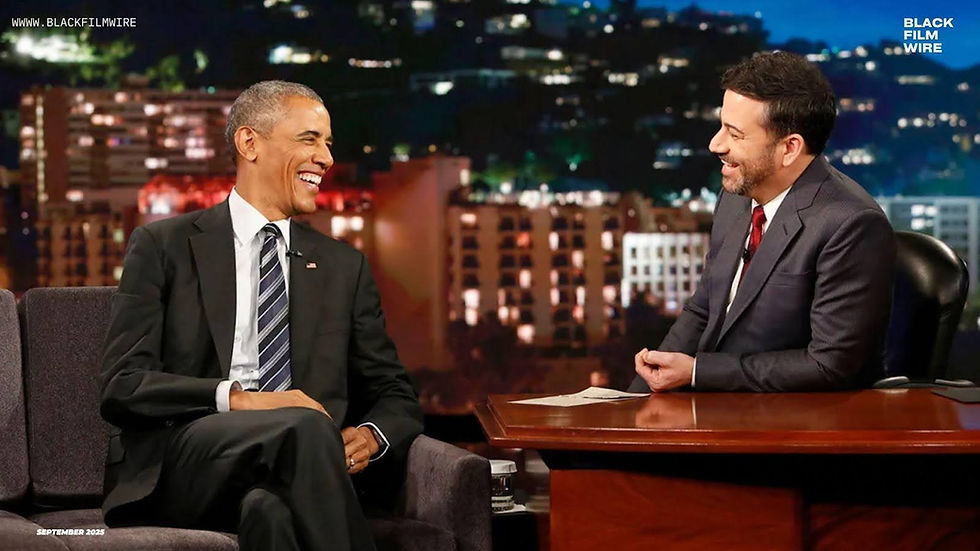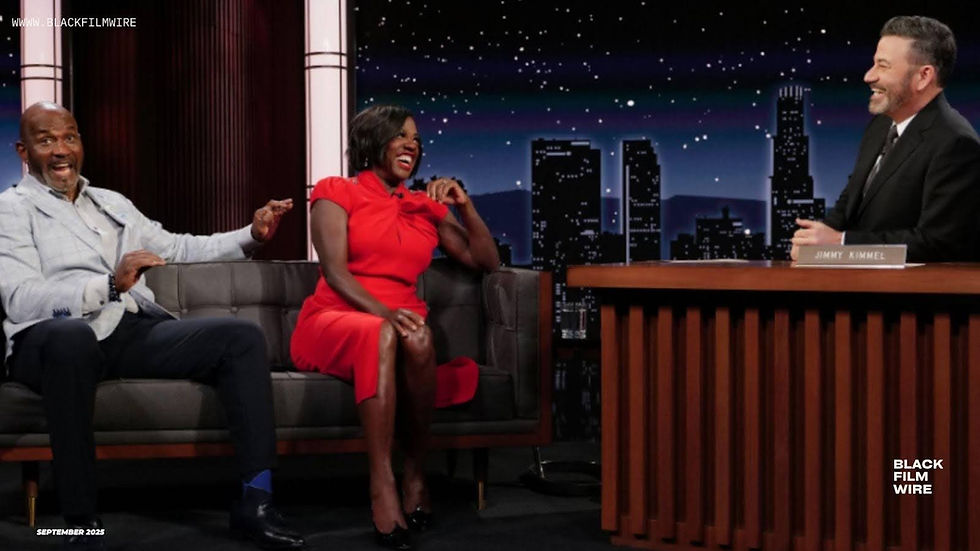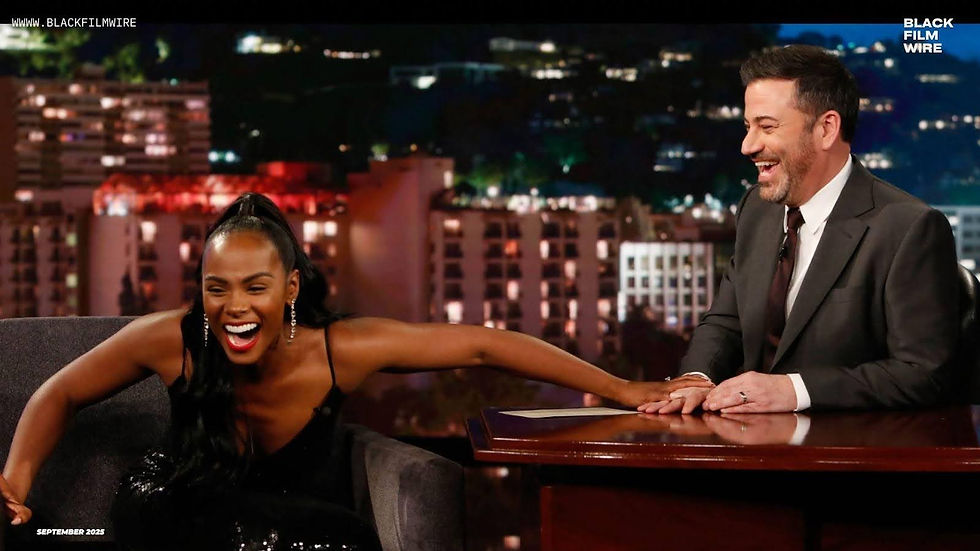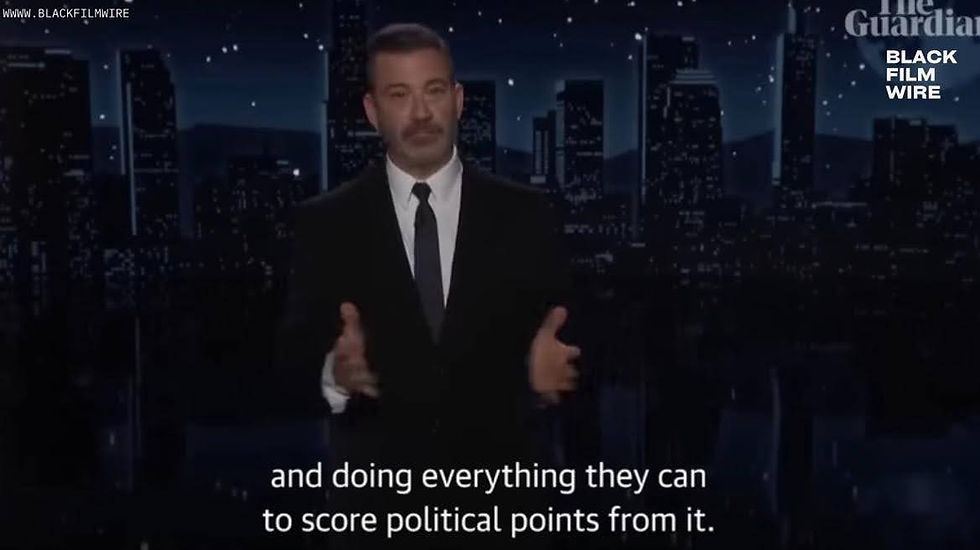Jimmy Kimmel Canceled: What It Means for Late-Night TV and Thought Leadership
- Sahndra Fon Dufe

- Sep 18, 2025
- 6 min read

When a network pulls the plug, even temporarily, it forces us to ask: who holds the megaphone? Who defines the boundaries of acceptable speech? And what have we lost when someone so central to late-night is silenced, however briefly?
The End of an Era?
When ABC suspended Jimmy Kimmel Live! in September 2025, the news landed like a cultural earthquake. For over two decades, Kimmel wasn’t just a late-night host—he was a voice. Sometimes messy, sometimes raw, but always unafraid to mix laughter with vulnerability. His show was the place where we got pranks, belly laughs, and also the moments that made us pause and think.
Why We Loved Him: Through the Eyes of Black Celebs
Kimmel’s legacy rests on balance: he could shift from absurd sketches to human conversations that felt unscripted.
President Barack Obama (2015) sat on his couch and delivered both tough reflections on Ferguson and lighthearted jokes while reading “Mean Tweets.” That duality was peak Kimmel—serious but accessible. Obama came to the show in person, bringing with him both weighty topics—Ferguson, race relations, student aid—alongside lighter moments: Mean Tweets, jokes, even questions about daily stuff. The show balanced being serious and being human.

Viola Davis (multiple appearances) spoke openly about aging and menopause, breaking taboos in a setting that usually plays things safe. After his suspension, she posted: “My heart continues to be broken every day… You’ve been beyond kind to me.” She has appeared on the show multiple times. One clip that sticks is when she openly discussed going through menopause on air—talk of such deeply personal, often unseen experiences. It mattered because it defied what is often considered “too private” or “too real” for late-night.



Other stars—Octavia Spencer, Kevin Hart, Lupita Nyong’o—found a host who gave them space to laugh and to be seen fully, not just as headlines.
Those moments mattered. Beyond publicity, they were trust, and allowed for humanity beyond image. They showed that comedy + talk shows can be spaces where culture, race, identity, aging, health, grief: all that stuff can live. For many Black celebrities especially, Kimmel’s stage wasn’t just late-night comedy—it was a platform for authenticity.
Starting point
Jimmy Kimmel Live! premiered in January 2003. It wasn’t the first late-night show anyone thought would dominate, but Kimmel steadily built a style: the monologue, the prank, the surprise guest, the moment of realness in between the comedy sketches, according to Wikipedia. One of the frequently praised bits has been his recurring gag: “My apologies to Matt Damon, we ran out of time.” Apologies to Matt Damon, We Ran Out of Time
It became iconic not just for the joke itself, but for what it told you: Kimmel didn’t take himself too seriously.

What He Said Now?- The Controversy

The controversy came from Kimmel’s monologue on September 15, 2025, where he spoke about Charlie Kirk’s killing and the political aftermath. His comments included:
Suggesting some groups were mischaracterizing the accused shooter “to score political points.”
Critiquing how condolences were delivered, comparing it to how “a four-year-old mourns a goldfish.”
The sharpness of those remarks—especially tied to such a recent tragedy—sparked backlash and led to ABC pulling the show.
Bigger Than One Host: What This Means for Thought Leadership
The suspension raises deeper questions about late-night TV as a space for thought leadership:
Risk vs. Reward – Can hosts still push boundaries, or will fear of cancellation keep them safe? Thought leadership requires risk; without it, we get safe and self-censoring.
Network Pressure – With affiliates and advertisers pulling strings, how much creative freedom is left? That risks making talk shows less authentic.
Audience Shifts – Younger audiences expect rawness and vulnerability. If TV can’t provide it, they’ll go to TikTok, YouTube, podcasts or whatever ‘whatchumacallit’ currently being created.
The Role of Hosts – They’re no longer “just comedians.” They’re cultural commentators—sometimes the closest thing we have to public philosophers in mainstream media.
Free speech dynamicsThe debates we’re seeing now—about regulatory pressure, affiliate pull-outs, political backlash—feed into larger discussions about what free speech means in media, especially across platforms. Kimmel’s suspension is being cited by Barack Obama himself as “government coercion,” according to Entertainment Weekly.

Earlier this summer, industry chatter intensified around late-night television after CBS ended The Late Show with Stephen Colbert. Soon after, speculation grew about the future of other hosts, with headlines noting that Jimmy Kimmel’s show was also in the spotlight. Reports surfaced that Disney’s decision to pull Jimmy Kimmel Live! was described in some outlets as “big news” for the US, while discussions about the future of other late-night fixtures like Jimmy Fallon and Seth Meyers also made waves.
Quotes That Capture Why Culture Cherishes Him


“Media companies need to start standing up rather than capitulating to it. This is precisely the kind of government coercion that the First Amendment was designed to prevent.” — Barack Obama, reacting to Kimmel’s suspension.

Sidebar: The History of Late-Night Television in the US
1950s: Tonight Starring Steve Allen sets the template: monologue + interviews + music.
1960s–70s: Johnny Carson dominates, making late-night the heartbeat of pop culture.
1980s: David Letterman experiments with irony. Arsenio Hall brings hip-hop and Black culture into the spotlight.
1990s: Jay Leno vs. Letterman, while Conan O’Brien brings quirky chaos.
2000s: Jon Stewart and Stephen Colbert turn satire into political thought leadership. Jimmy Kimmel debuts in 2003, balancing pranks and sincerity.
2010s: Fallon’s viral games, Trevor Noah’s global perspective, Samantha Bee’s female voice.
2020s: Ratings decline, streaming rises. With Colbert canceled and Kimmel suspended in 2025, the old late-night model is under question.
Sidebar: Cancel Culture – When it Began and Who’s Been Impacted
“Cancel culture” entered mainstream conversation around the mid-2010s, fueled by social media platforms like Twitter (X) where past comments or controversial actions could resurface instantly. By the late 2010s, being “canceled” often meant losing deals, shows, or audience trust almost overnight.
Barack Obama weighed in on the phenomenon in 2019: “The world is messy; there are ambiguities. People who do really good stuff have flaws. That’s not activism. That’s not bringing about change.” His words remind us that nuance is often lost in the rush to judge.
Notable Black Celebrities Who Faced “Cancellation” or Backlash Over the Last Decade
Kanye West (Ye) – lost major brand partnerships after antisemitic comments (2022)
Will Smith – banned from the Oscars for 10 years after the Chris Rock incident (2022)
Nick Cannon – dropped by ViacomCBS over antisemitic remarks (2020; later reinstated)
Kevin Hart – stepped down as Oscars host after resurfaced homophobic tweets (2018)
DaBaby – faced festival cancellations and backlash after homophobic remarks at Rolling Loud (2021)
Chris Brown – ongoing public pushback tied to past incidents (2009 onward)
Tiffany Haddish – backlash over resurfaced comedy sketches (2022)
Through Their Eyes
For Black artists and audiences, Kimmel’s platform was more than TV—it was cultural space. Viola Davis’s tribute summed it up best: “You’ve been beyond kind to me.” And Barack Obama’s defense of free media after the suspension showed that the stakes weren’t about one host—they were about the larger health of conversation in America.
Final Thoughts
Jimmy Kimmel’s suspension is more than a headline—it’s a marker of how precarious public conversation can be on TV when power, politics, and performance collide. For over 20 years, he has given us space to laugh, cry, reflect, and think, mixing honesty with humor while holding room for vulnerability and dialogue. In an age of disposable content and hot takes, Kimmel reminded us that thought leadership on television isn’t just about opinions—it’s about creating space for people to speak, challenge, and belong. Fans reacted with a mix of surprise and admiration, noting the trust and privacy he’s maintained even in an oversharing industry. We wish him well on the next phase of his creative and journalistic journey.
TLDR | What Comes Next: Reimagining Thought Leadership in TV
If we take this moment seriously, here are some possible paths forward:
More platforms, less centralized control.
Hosts who embrace accountability & clarity
Networks reevaluating risk vs reward
Audience literacy rising




Comments